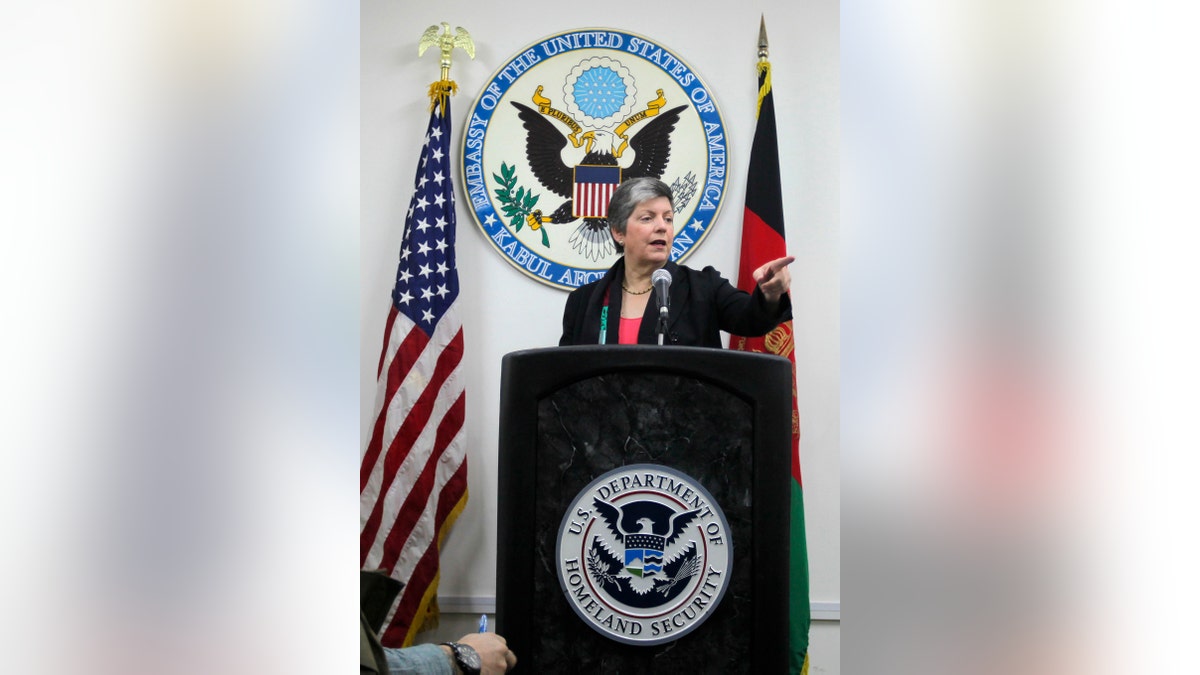
U.S. Homeland Security Secretary Janet Napolitano addresses media at the U.S. embassy in Kabul, Afghanistan, Saturday, Jan. 1, 2011. Napolitano said on Saturday she will send more U.S. experts to train Afghan police and customs officials to better manage the country's porous border crossings.
KABUL, Afghanistan – The U.S. will send more American experts to train Afghan police and customs officials to better manage the country's porous border crossings, U.S. Homeland Security Secretary Janet Napolitano said on Saturday, noting that such training was critical to preparing for the eventual exit of foreign troops.
Napolitano met with President Hamid Karzai and Afghanistan's finance minister and also planned on meeting with the interior minister before leaving for Qatar later in the weekend.
Karzai's office said in a statement that during their talks, Napolitano said the United States would help Afghanistan with equipment and capacity building for the country's customs operations and with the training of border police.
Karzai told the visiting secretary that the Afghan side was trying to strengthen its capacity and that the country would be able to assume responsibility for security in four years' time, when international combat troops are expected to hand over to Afghan security forces.
It will be difficult, however, to train enough Afghan border police and agents to control the porous border with Pakistan. Thousands of U.S.-led troops have been unable to stop Taliban fighters and Islamic extremists from crossing the rugged frontier to fight NATO forces. Opium is also smuggled out of the country yearly.
What they can do is try and train customs agents to better collect import taxes for government coffers — although in some parts of the country much of that revenue is lost to corruption.
For the past year, Napolitano's department has been working with the Afghan government establish a border security and customs system and crack down on the smuggling of drugs and cash.
Napolitano said 52 former U.S. customs and border patrol officers would arrive in Afghanistan in 2011. The Homeland Security department currently has 25 agents on the ground, up from 11 a year ago.
Halting the flow of billions of dollars of cash from Afghanistan is a top U.S. priority. Since 2007, an estimated $3 billion in cash has flowed out of Afghanistan through the country's two major airports, most of it to Dubai, according to Afghan police and intelligence officials.
Finance Minister Hazrat Omar Zakhilwal's office said in a statement he and Napolitano discussed the cash-flow issue and that an action plan to address it was deemed "as necessary." The statement did not elaborate on what steps might be taken. But the ministry said the U.S. has been providing assistance to better organize the network of money transfer enterprises — commonly known as hawalas — and improving the way in which cash transfers are regulated and tracked.
While taking large amounts of money is not illegal under Afghan law, the scope of the transfers has alarmed U.S. and other international officials because it could be aid funds that have been diverted, drug money or Taliban cash.
Hawalas, in particular, have been a source of concern for the U.S. since the transfers are largely untraceable and officials worry that the systems are used to funnel money across Afghanistan and elsewhere in the Muslim world to militants.
Napolitano said training border police and customs officials was an important part of NATO's overall aim to transition security to Afghan forces by the end of 2014 — when most foreign combat troops are expected to leave the country.
In southern Afghanistan, the U.S.-led coalition said one of its service members was killed by a bomb — the first to die in the new year. It did not provide details.
Last year was by far the deadliest for foreign troops in the decade-old war, with 702 killed, eclipsing the 2009 record of 504.
NATO also said it killed at least eight insurgents and captured a Taliban leader in several operations throughout Afghanistan. It was unclear whether the Taliban leader was killed or detained.
